In the face of complex, evolving and interconnected global challenges, we need more engineers and technicians than ever, with a wider range of skills and a more diverse range of perspectives.
In 2022/23, our work to foster talent and diversity sought to increase the number of people from underrepresented backgrounds entering the profession, including women, those from Black, Asian and minority ethnic backgrounds, LGBTQ+ people, and those with disabilities or who are neurodiverse; as well as efforts to better connect emerging engineering leaders to Academy networks to support their ongoing development.
Building a sustainable society and inclusive economy
Our impact in the UK
Funding engineering across the world
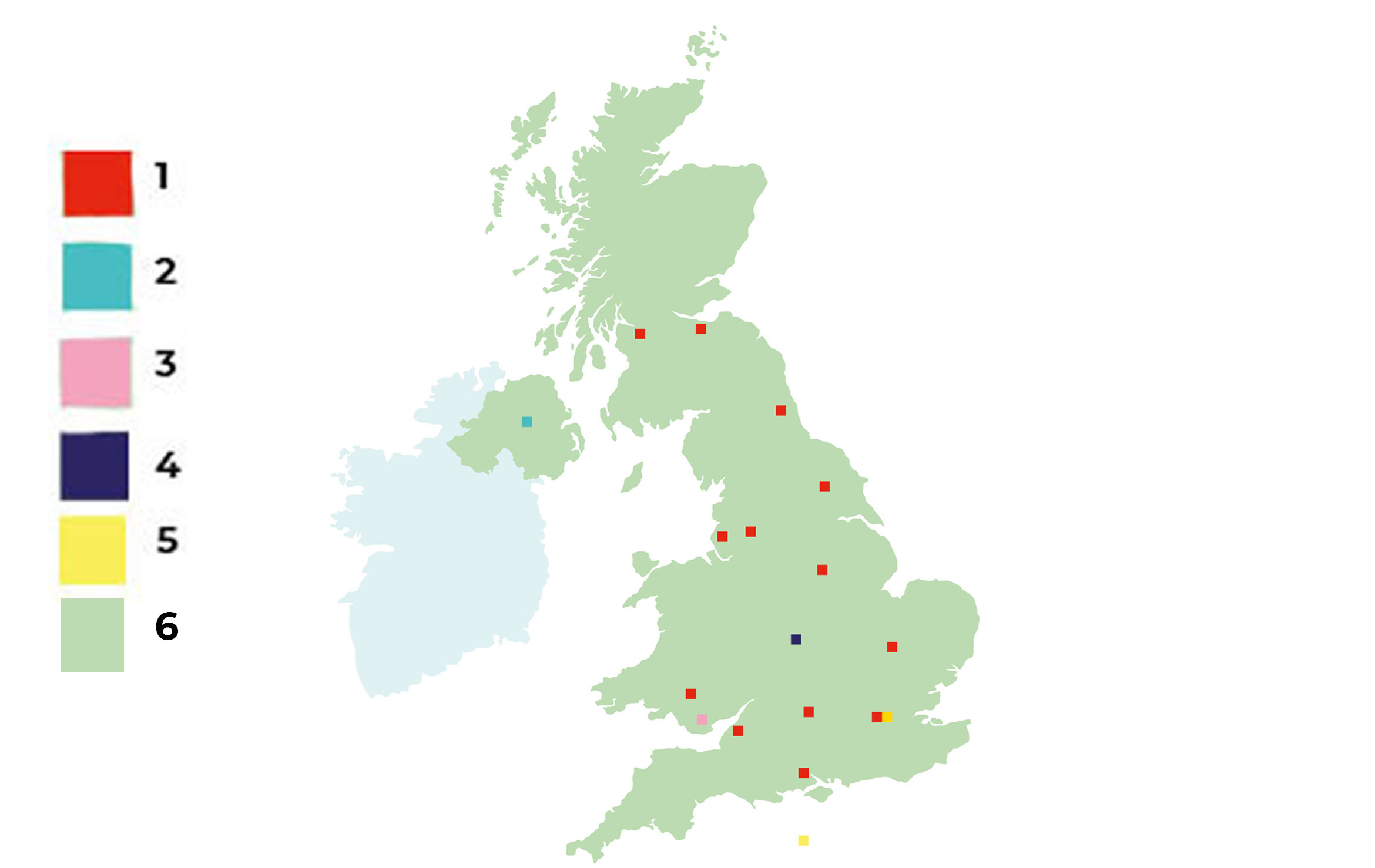
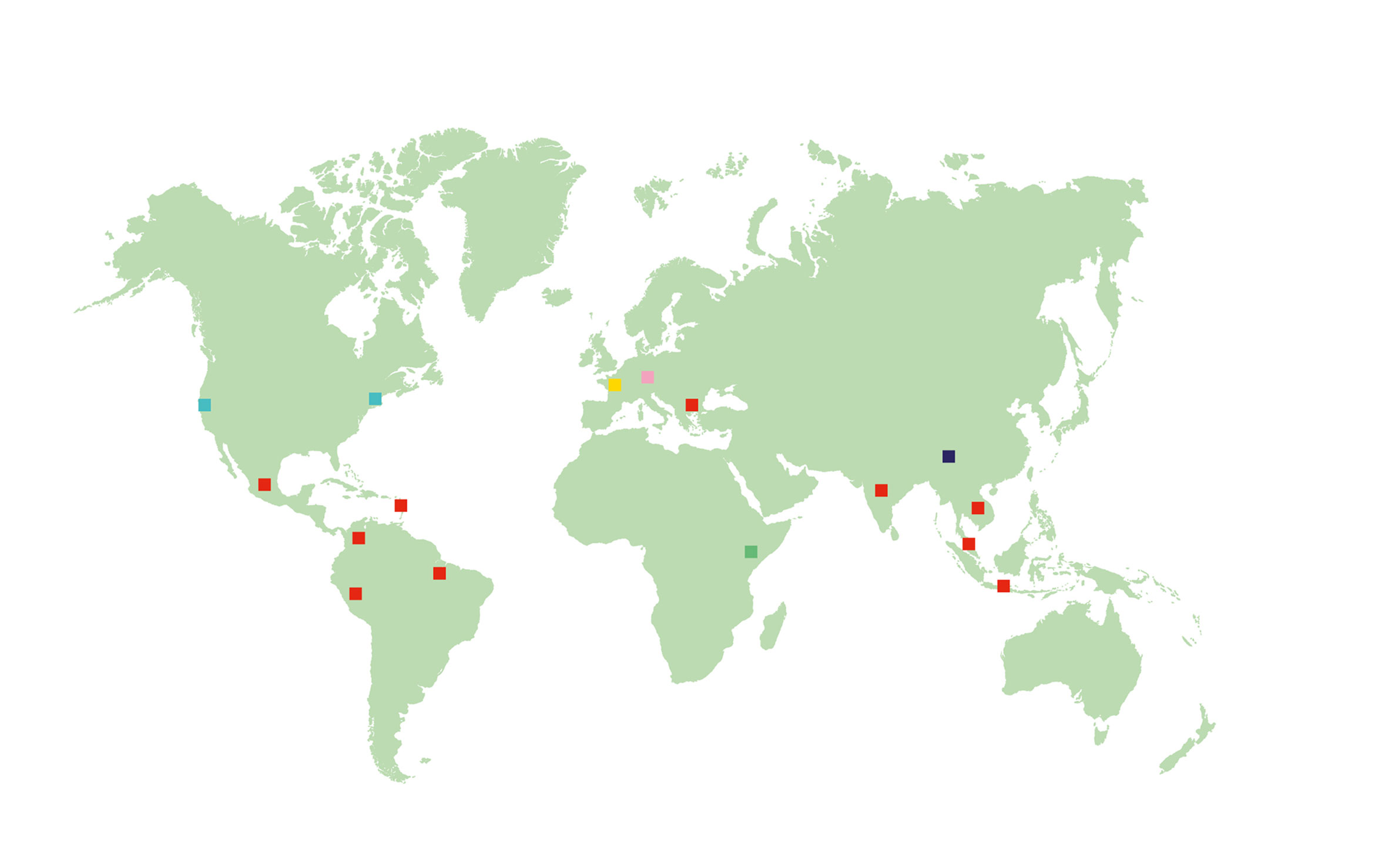
- Our Chairs in Emerging Technologies programme supports 40 researchers at 17 universities.
- We launched a Northern Ireland Engineering Education Programme supporting young people particularly from underrepresented groups, to follow careers in engineering.
- Elis Thomas is our first recipient of the Panasonic Trust higher education bursary, part of the Welsh Valleys Engineering Project.
- The Lord Bhattacharyya Engineering Education programme, worked with 25 schools and colleges in the West Midlands to encourage young people to progress into engineering
- More than 300 leaders from industry, academia, government, media, and policy attended our Awards Dinner, with awards given for robotic skin, miniature AI sensors, a new imaging technique for healthcare or radiation mapping, and much more
- The LIF Global programme gave 349 hours of training and 1,226 hours of mentoring, resulting in 46 new IP registrations, 18 new UK partnerships, creation of 54 jobs, and over $2 million in funds raised.
- The EXPLORE deep-tech programme supported 5 life sciences and 5 AI and machine learning specialists innovators to access opportunities in Massachusetts and San Francisco.
- We’ve formed an alliance with 7 national engineering academies in Europe to develop policy advice on sustainable strategies for critical raw materials.
- We launched a new framework for collaboration with China on net zero, alongside a workshop to strengthen UK–China partnership on offshore wind.
- Engineering X’s global review of the engineering response to COVID-19, was presented to senior delegates from 30 countries, covered by 194 news outlets in 37 countries as well as on the National Preparedness Commission website.
- The Africa Prize for Engineering Innovation was awarded to Norah Magero – the first Kenyan and second woman to win the award.
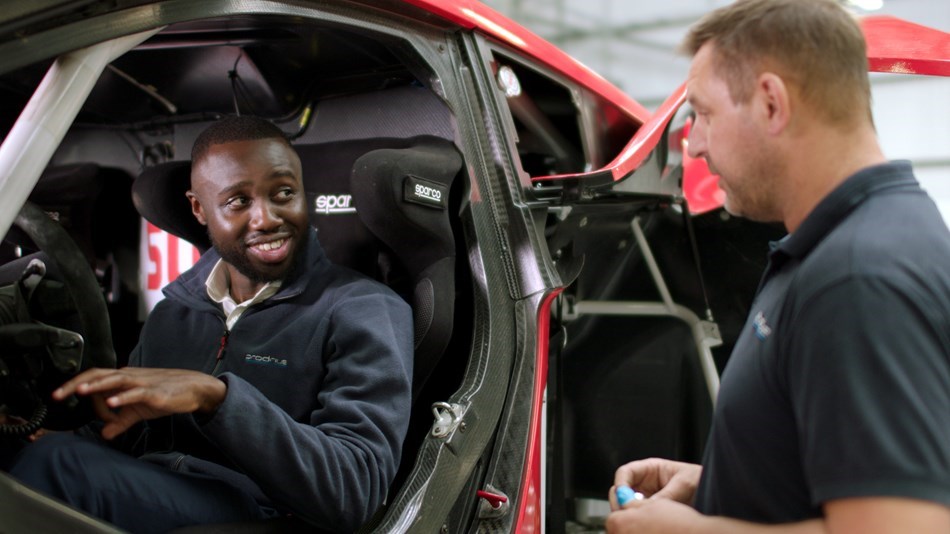
Our MSc in Motorsport Scholarship Programme aims to help more people from Black and mixed Black ethnic backgrounds study a motorsport-related subject
Talent and Diversity
Engineers can and must be influential agents of change as we strive to build a more sustainable society, providing leadership both within and beyond the UK.
To respond to this need, the Academy’s strategic goals include helping to increase the diversity, quality and quantity of engineers in the UK and internationally, and promoting a truly inclusive engineering workforce that sets the highest standards of technical excellence, ethics and professionalism.
MSc Motorsport Scholarship Programme.
Thanks to generous funding from The Ignite Partnership, in 2022 we launched the MSc Motorsport Scholarship Programme. This will support individuals from Black and mixed Black ethnic backgrounds to study for a master’s degree related to motorsport.
The programme is a direct response to recommendations made by the Hamilton Commission report, Accelerating Change: Improving Representation of Black People in UK Motorsport, co-chaired by Sir Lewis and our CEO Dr Hayaatun Sillem CBE. The Board of Commissioners also included our Honorary Fellows Dr Nike Folayan HonFREng and Dr Anne-Marie Imafidon HonFREng.
Our objective is for 90% of scholarship awardees to be working in engineering roles – with the majority in motorsport – within two years of completing their MSc.
Diversity Impact Programme
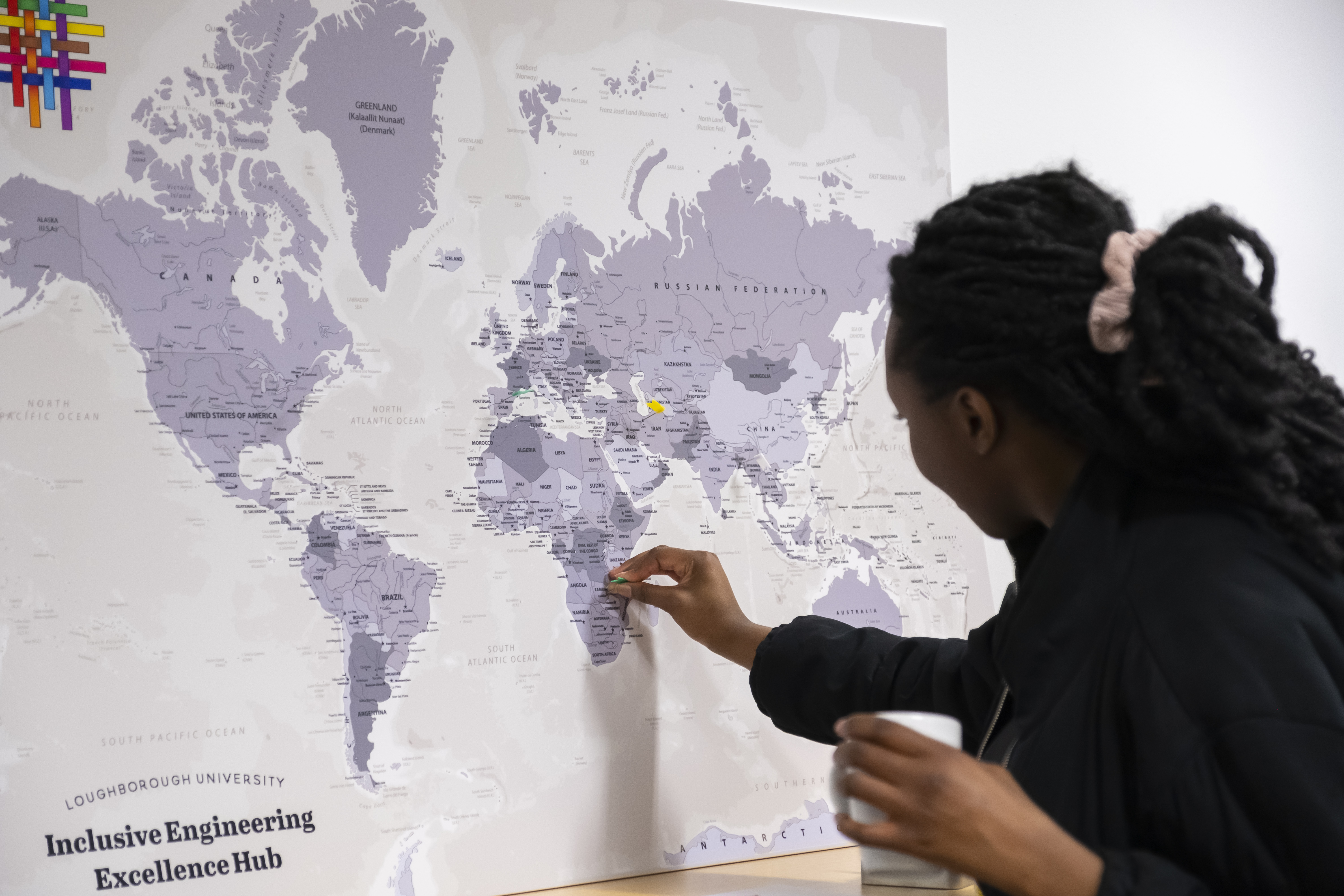
Loughborough University students use the Inclusive Engineering Excellence Hub, created with support and funding from our Diversity Impact Programme © Phil Wilson
Our Diversity Impact Programme aims to inspire change in university engineering departments, so all students can succeed and the unique perspectives and experiences of engineers from diverse backgrounds can enhance the profession.
After our 2020/21 governance review recommended creating a unified network to bring together the Academy’s awardees, in July 2022 we launched the Awardee Excellence Community. It unites 3,000 current and past awardees and prize winners from across our UK and international programmes.
Over 600 awardees responded to a survey about the community shortly after it was launched, with nine out of ten people saying they were interested in participating. The chance to network and guide the Academy’s work were seen as the most valuable aspects.
Together with the Academy of Medical Sciences, British Academy, Learned Society of Wales, Royal Irish Academy, Royal Society of Edinburgh, and the Royal Society, in June we supported the launch of the UK Young Academy – the first UK-wide network connecting exceptional early-career researchers, innovators, clinicians, professionals, academics, and entrepreneurs.
Our Access Mentoring scheme is also working to increase the diversity of our grant applicants and awardees. It’s a powerful way to improve diversity in the talent pipeline. Since launching in 2021, 108 applicants have received Access Mentoring, and the feedback has been positive.
For 10 years, our Connecting STEM Teachers (CST) programme confronted this challenge, by creating a national support network for teachers across all STEM subjects. The network helps teachers gain the knowledge and confidence to engage more students from more backgrounds with STEM. In June 2022, we celebrated CST’s impact with over 125 students and teachers at an anniversary event, held at Prince Philip House.
In spring 2022, we launched a pilot initiative to encourage more young people in Northern Ireland, particularly young women and people from underrepresented groups and disadvantaged backgrounds, to progress towards professional engineering roles. We support a network of 52 schools and colleges with grants, peer-to-peer support, links with industry, and more so that young people can continue into further and higher education.
In July 2022, our Welsh Valleys Engineering Project (WVEP) expanded to include all 54 schools in Blaenau Gwent and Merthyr Tydfil
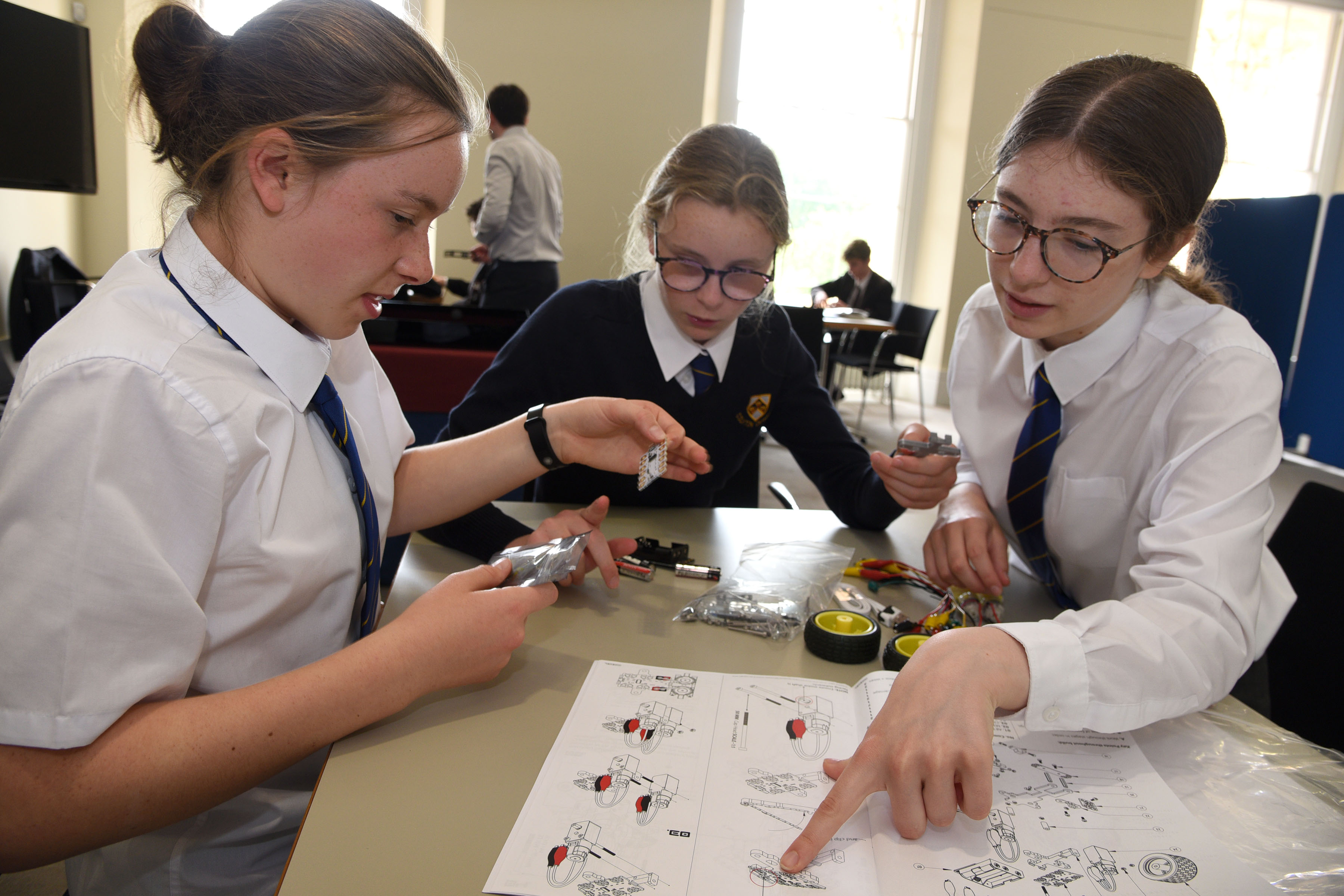
Students from Colyton Grammar School in Devon, who were winners of our Sustainable Futures Innovation Challenge, announced at CST’s anniversary event, with their idea for a reusable, edible, plastic-free container
Over the past five years, WVEP has delivered over 25,000 STEM learning opportunities. In 2022, Welsh Economy Minister Vaughan Gething MS called the project an ‘integral part’ of the government’s efforts to enable the South Wales Valleys to become a globally recognised centre for technology.
In March 2023, 80 Year 12 students took part in a unique ‘Build a dome in a day’ engineering workshop in the nave at Holy Sepulchre, Holborn Viaduct – inner London’s largest parish church, supported by funding from our Ingenious programme.
In June 2022, we took on a leadership role in the Digital Skills Council, created following the launch of the government’s UK Digital Strategy. In its first year of operation, the council has built strong stakeholder relationships to ensure that it works in partnership to amplify ongoing work.
Innovation
Engineering innovation and enterprise have the power to improve productivity, competitiveness, public health, safety and security, while also delivering economic and social value for people from all parts of the UK. A key focus of the Academy’s strategy is on fostering a bigger, more resilient and more diverse network of engineering innovators, with the connections, insights, commercial awareness and leadership skills to turn ideas into reality.
Since 2018, the Academy has invested £94 million into the Chairs in Emerging Technologies (CiET) programme, supporting 40 global research visionaries over 10 years.
In early 2023, we carried out our first mid-term review to evaluate the chairs who received awards in 2018.
Nine site visits across the country showed that the awards have helped: raise £95 million in additional funding; support 236 team members; create 12 spinout companies; license 12 patents and grant nine; and foster 111 UK collaborations and 76 international collaborations.
In 2022/23, our research programmes supported partnerships between 22 universities and 34 industrial partners through 24 Industrial Fellowships and 10 Research Chair/Senior Research Fellowships, 18 of which were collaborations with SMEs.
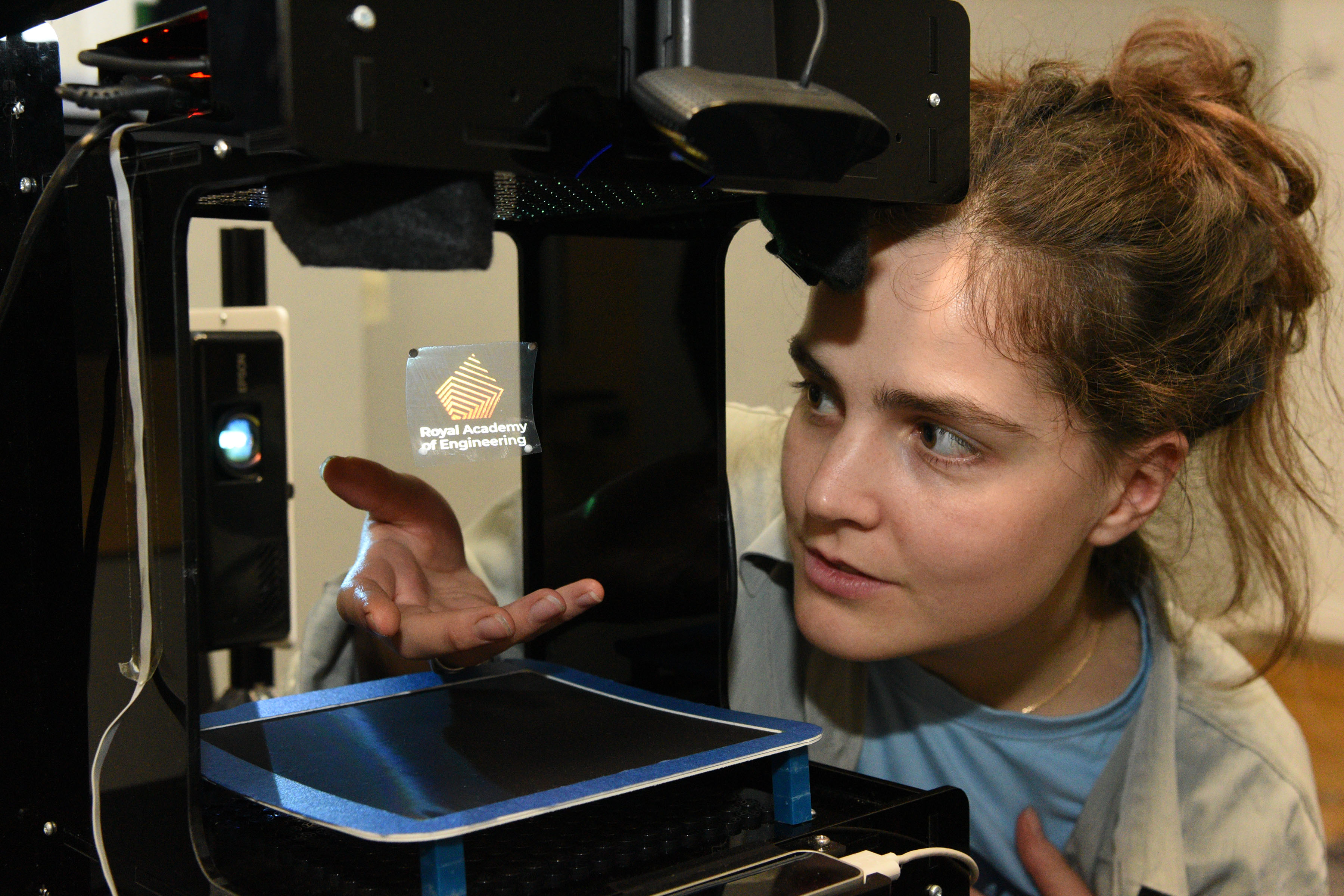
A piece of fabric with the Royal Academy of Engineering logo is levitated using sound waves at our annual Research Forum, demonstrating the work of Professor Sriram Subramanian’s team at UCL. Professor Subramanian is a Chair in Emerging Technology, researching interactive technologies using metamaterials
Additionally, the UK Intelligence Community Postdoctoral Research Fellowships awards made in 2022 supported development of new technologies that address the increasingly complex demands of deception analysis, and deliver future 6G wireless systems, as well as the use of autonomous robot swarms for underground excavation.
In 2022, our Leaders in Innovation Fellowships (LIF) programme brought together 70 emerging innovation leaders from 10 countries – in Asia, the Caribbean, Europe, and Latin America – for six months of bespoke training and mentoring.
Over the course of the programme, innovators received a total of 1,226 hours of mentoring (an average of 18 hours per innovator over five months), and 94% of innovators and mentors said that they will continue their relationship beyond the programme – a strong testament to the connections they’ve built.
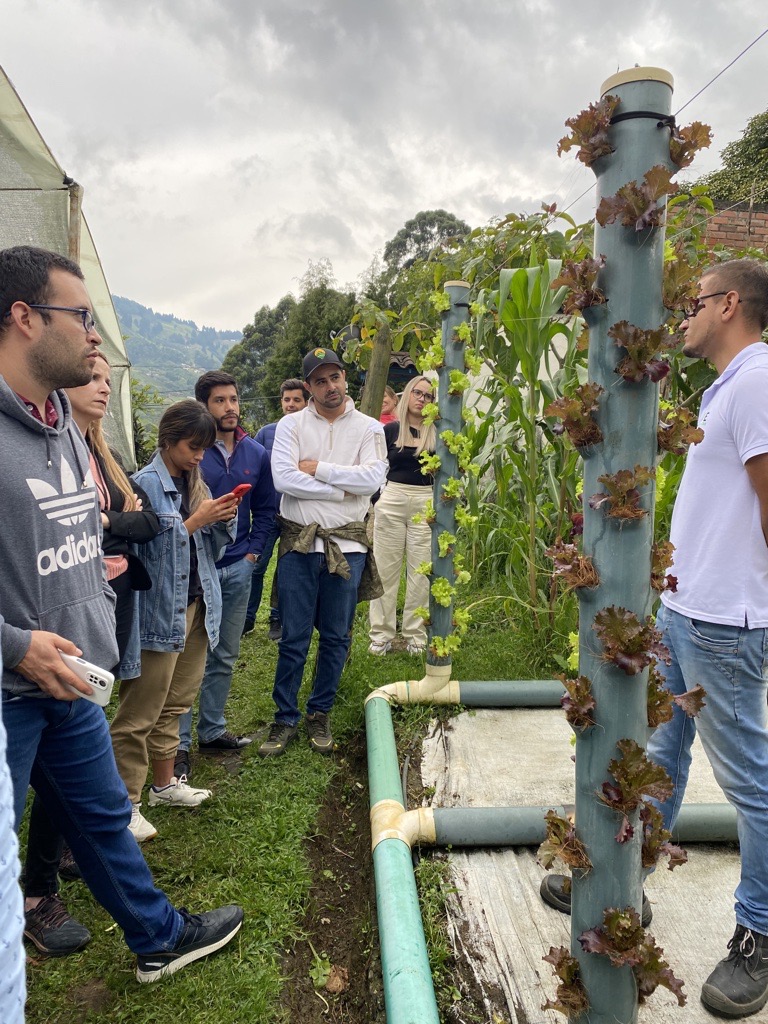
Innovators at a Leaders in Innovation Fellowships in-country event in Colombia meet a vertical agricultural farmer in the suburbs of Medellin
Expansion of the Enterprise Hub
Our Enterprise Hub celebrates its 10th anniversary in 2023. Over the past decade, the Academy has supported over 350 of the brightest engineering and technology entrepreneurs through the Hub, including with over £11 million of grants, mentoring from Academy Fellows, training, and lifetime membership of an unparalleled network of like-minded innovators. Hub member startups have gone on to raise over £1.3 billion in additional funding.
In 2022 we launched Enterprise Hub Wales to help continue this growth and support the research and enterprise ecosystem across the country. Based in Swansea, Enterprise Hub Wales will build on the work done by Swansea and Cardiff universities, fostering startups, scaleups and deep-tech innovation, supporting job creation, and collaborating with organisations across Wales.
EXPLORE programme
EXPLORE is an exclusive programme for Academy alumni, run through the Enterprise Hub, that supports the UK’s most promising engineering entrepreneurs working in deep tech. Our first cohort brought together deep-tech founders focused on life sciences. They travelled to Massachusetts in April 2022 for their international mission.
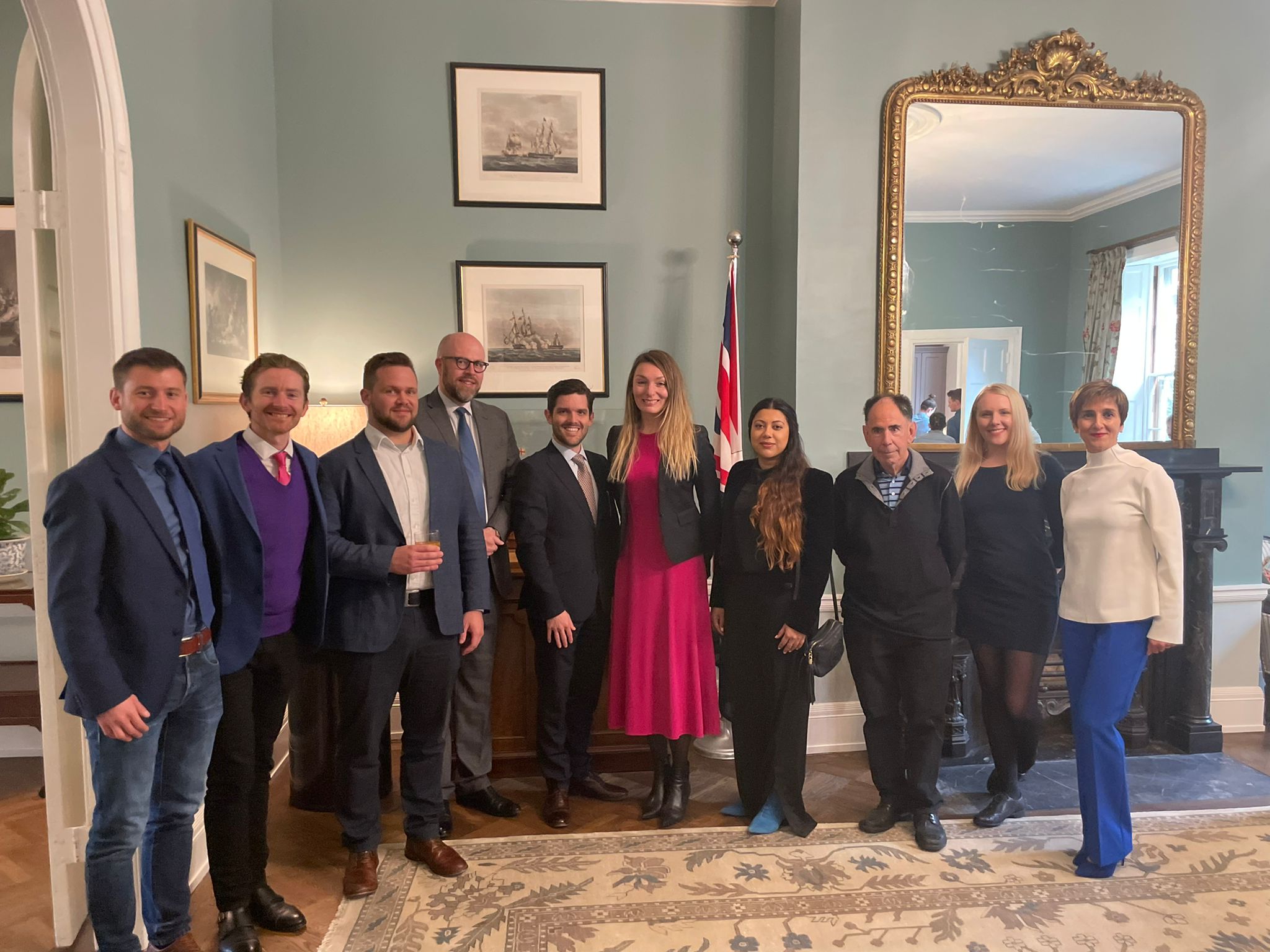
The first cohort of the EXPLORE mission in Boston, Massachusetts
Guidance for spinout entrepreneurs
Our 2022 Spotlight on Spinouts report showed the enormous potential of spinouts, with 1,130 active in the UK in 2021 and a record £2.54 billion generated in equity investment – almost double the previous year.
Less positively, however, the report also showed the stark lack of diversity among directors and founders of UK spinouts – with 86% having all-male founders and 92% having all-male directors.
Our new Entrepreneur’s Handbook is designed to support more academics from every background to understand and navigate the challenges of building a spinout.
Policy and engagement
Guided by our strategy for 2020–25, the Academy strives to ensure engineering expertise is accessible to policymakers across all government departments, and engages with wider society. In 2022/23, this work ranged from leading the debate on low-carbon hydrogen to broadening public perceptions of what engineering looks like by collaborating with Great British Bake Off contestants.

Great British Bake Off engineers (L–R) Andrew Smyth, Dr Giuseppe Dell’Anno and Dr Rahul Mandal with the working clock cake that they baked for National Engineering Day in 2022
National Engineering Day is a central part of our ongoing This is Engineering campaign to inspire young people to consider a career in engineering. There was widespread media interest throughout the day, including Zoe Ball talking about the day on her BBC Radio 2 breakfast show and Steph McGovern dedicating a whole slot to it on her Channel 4 Show Steph’s Packed Lunch.
National Engineering Day videos were watched over 200,000 times, related social media posts achieved over 77 million potential impressions across social media – almost double the number for 2021 – and National Engineering Day trended at #3 on Twitter.
Much of the interest was created by three former stars of the Great British Bake Off – who also happen to be engineers – teaming up to create a unique, edible clock cake.
Academy CEO Dr Hayaatun Sillem CBE raised further awareness by speaking at the WIRED Impact conference about diversity and inclusion, the role of engineering in sustainable development and the need to support entrepreneurs from underrepresented backgrounds.
Guiding policy development
Led by the Academy, the National Engineering Policy Centre (NEPC) is a partnership of 42 professional organisations, covering the breadth and depth of our profession.
In 2022, the NEPC launched a new five-year strategy, outlining four priorities to guide its work until 2027. These priorities were in evidence throughout the year, including in the publication of new research into infection control in indoor environments. Commissioned by Sir Patrick Vallance HonFREng FRS FMedSci, the government’s then Chief Scientific Adviser, and entitled Infection-resilient environments: time for a major upgrade, the NEPC study showed that infection control measures could save up to £23 billion a year during future pandemics.
In September, the NEPC published The role of hydrogen in a net zero energy system. The report examined the sustainability of hydrogen for major applications across the economy, including industry, power, transport, and heat and buildings. It called on the UK government to act swiftly to scale-up low-carbon hydrogen production to avoid falling behind international competitors.
As debate about the development of AI and its impacts on society intensifies, the NEPC set out the conditions needed for safe and ethical use of autonomous systems. While not all AI operates autonomously, autonomous systems do rely on AI. We set out examples of AI-enabled systems in healthcare alongside the particular considerations relating to their safe and trustworthy use in health settings.
Championing systems thinking with our policy fellows
In 2022 the Academy selected 19 exceptional policymakers to become policy fellows. Throughout the year, policy fellows championed systems thinking in policy, reaching 800 policy professionals through a series of knowledge-sharing events produced with the government’s Policy Profession Unit. These covered truly diverse topics.
For example, diplomat Chris Thomson explored how systems thinking can be applied to both River Clyde regeneration and diplomacy in Washington DC, while Eleanor Brown from the Department for Environment, Food and Rural Affairs (Defra) proposed taking a systems approach to the question of how to eradicate bovine tuberculosis. We also connected the 19 new policy fellows with 181 engineering experts from across industry and academia, and piloted peer-to-peer groups to build collaboration around topics of interest.
Engineering X and the open burning of waste
Engineering X is an international collaboration that brings together some of the world’s leading problem-solvers to develop practical, sustainable and accessible solutions to the most pressing engineering, safety and sustainability challenges.
In 2022/23, a key focus of the project’s Safer End of Engineered Life programme was the open burning of waste in Africa. Currently, only 11% of waste from Africa’s urban areas goes to managed landfills, with the rest dumped and burned. This dramatically impacts human health, as poor air quality is linked to 1.2 million premature deaths annually in Africa. The black carbon emissions also contribute to climate change.
The partnership will help mobilise African governments to implement a landmark resolution, agreed in September 2022, to improve waste management through new technology, infrastructure, funding and behaviour change campaigns.
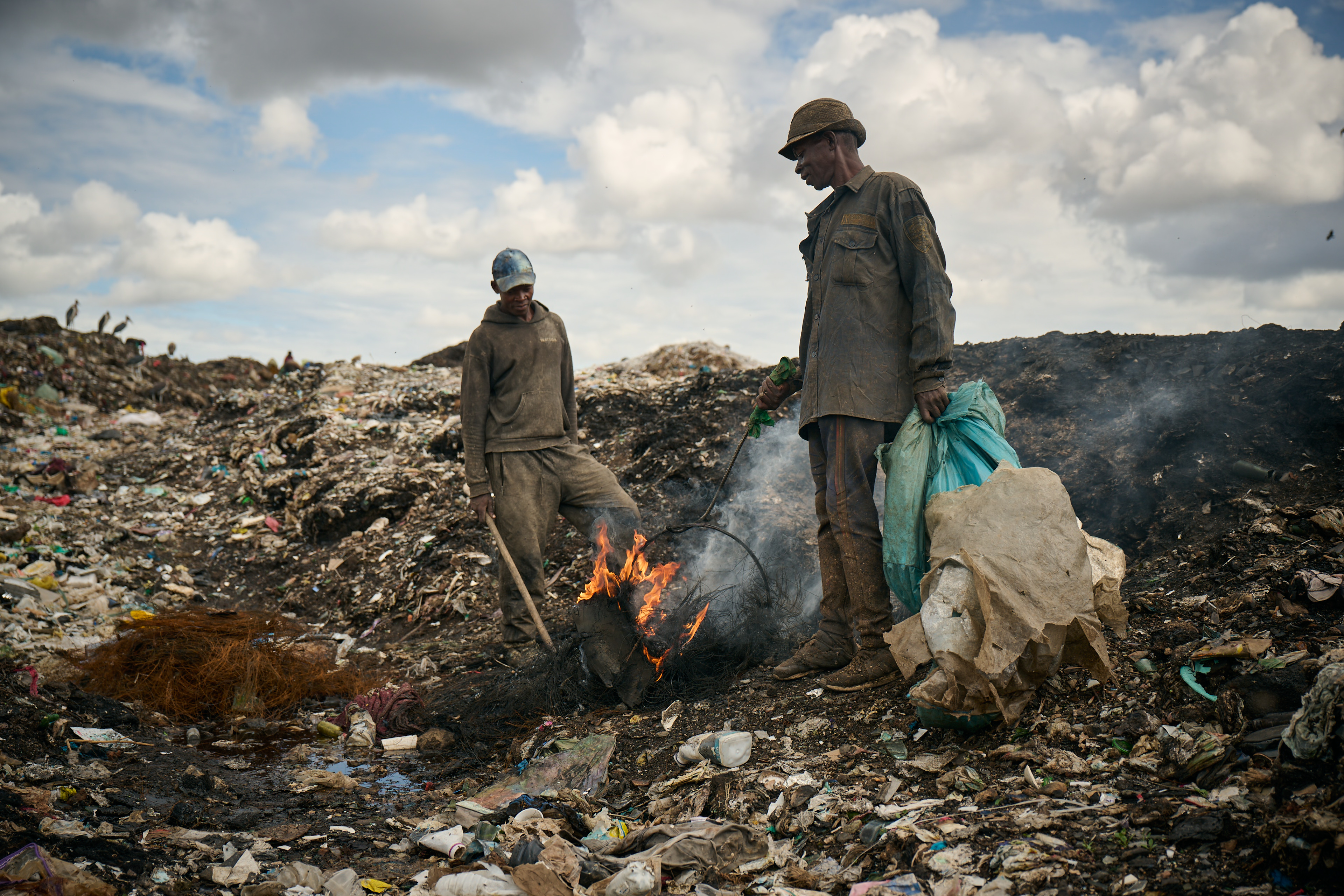
Workers at the Dandora dumpsite in Nairobi, Kenya, where open burning of waste has a significant impact on human health
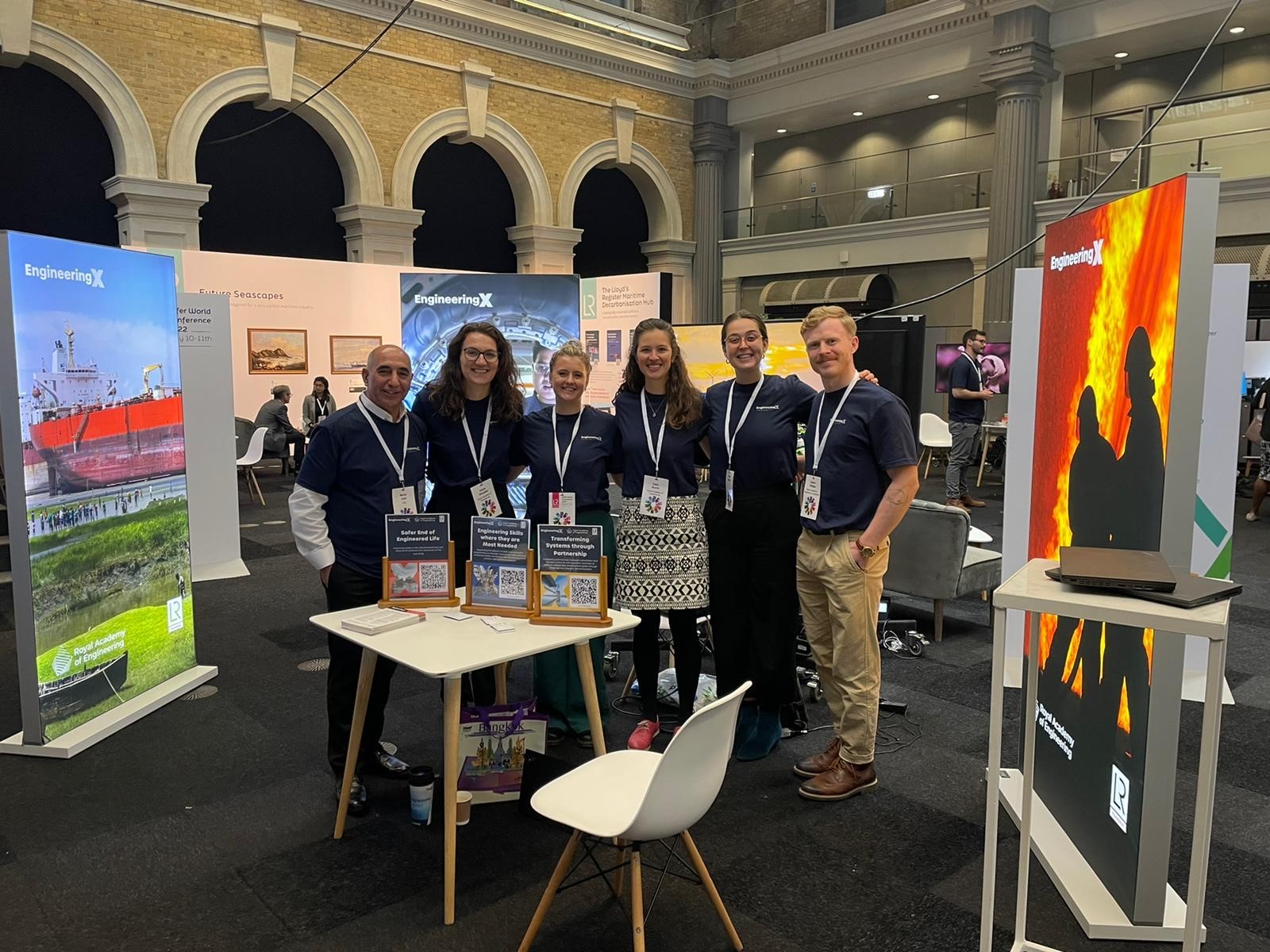
Academy staff members from the Engineering X team at the Lloyd’s Register Foundation Safer World Conference
People and operations
In order to deliver on the ambitions in our strategy and to create the best experience for everyone connected to the Academy, we are working intensively to improve our operational capability and our capacity to attract, retain and engage excellent staff.
In December 2022, we launched our new People Strategy, which supports the Academy’s overarching strategy. Our focus is on having aligned, healthy, fulfilled and highly engaged employees, with the skills, knowledge, behaviours and values to succeed, always supported by talented leaders.
Our staff team continues to grow, rising from 162 employees in April 2022 to 184 in March 2023, and we now have an increasing number of staff who are based regionally.
Our Environmental Sustainability Action Group continues to ensure that the Academy improves its environmental performance. Following our first carbon benchmarking exercise with Planet Mark, we worked with them again to do the same for 2020 to 2021.
With much of that year spent in lockdown and no international travel, the reduction when compared to 2019 to 2020 was extensive: 91%. The emissions from the building were also 22% reduced from the previous year.
Our Fellowship represents an unrivalled community of leading businesspeople, entrepreneurs, innovators and academics from every part of engineering and technology. Over the past year, Fellows have volunteered an estimated 22,500 hours to support the next generation of engineers and address societal challenges.
Our Fellows elected in 2022 reflect the Academy’s ongoing Fellowship Fit for the Future initiative, with 57% of those elected from underrepresented groups.
The Academy’s Trustee Board is also committed to forming a Board that is fit for the future, defined as a body that represents the full breadth and diversity of engineering excellence, as well as the skills and experiences needed to provide effective leadership for the Academy. In support of this commitment, the Trustee Board has agreed to publish its own diversity data.







